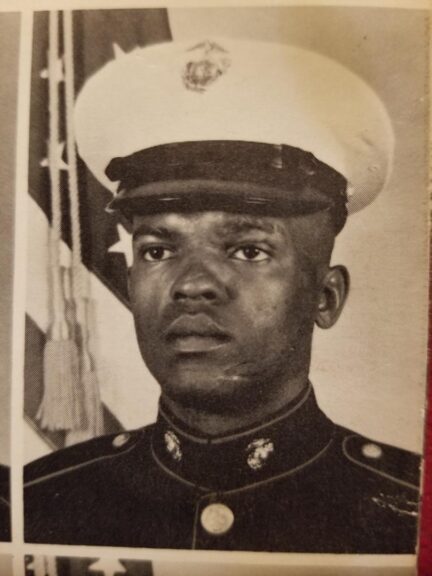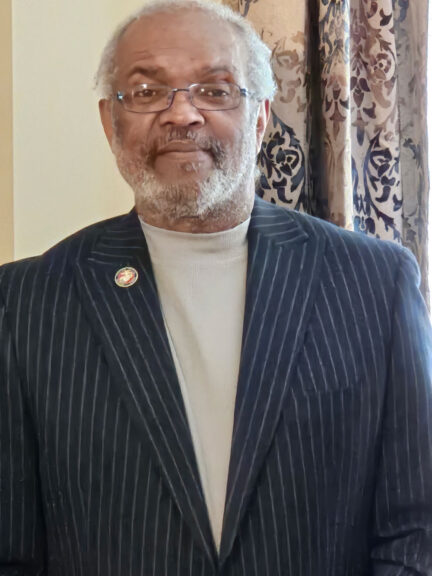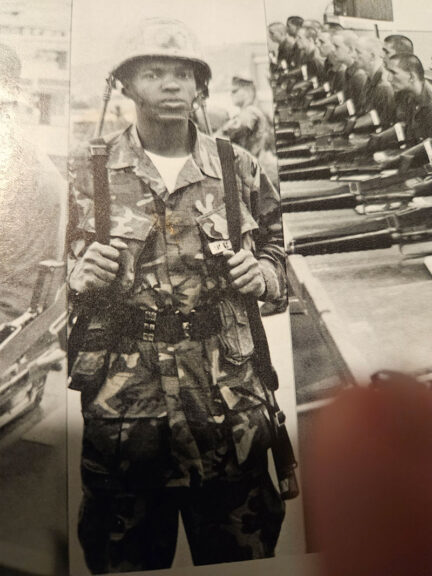Diagnosed with paranoid schizophrenia as a teen, Ray Lay shares how battling mental illness and substance abuse forced him to be homeless. Learn how joining the Marines and getting his GED paved the way for his success. Today, he provides peer support for veterans, is a board member of the National Alliance of Mental Illness (NAMI) and is an advocate for those struggling with mental health and homelessness.
The podcast begins with Lay sharing how a near-fatal accident as a child led to him being committed to a state-run mental institution.
What led up to your being in a correctional facility as a teen? That must have been difficult…

Well, yes, it was for me and for my parents. For me, it was, I can’t say culture shock, but in so many words, yes, it was. I was sent to a boys’ school because I, as I say, I committed an abundant amount of anti-social acts. I stole a car. I had stolen many cars and I got caught. The judge sent me to a boys’ school. I kind of wished at that time in hindsight that the judge would have had the ability to recognize that what was happening was, I was experiencing a mental health crisis. It was a shock to me and I was in a boys’ school — the Indiana Boy School in Plainfield, Indiana — which is approximately 25 miles from where I live now. There was no treatment for mental health conditions or mental illness. I never saw a psychiatrist there. I never saw a therapist there. Nor was I introduced to any kind of medications of which today I am on medication.
During the podcast, Lay explains how times have changed for adolescents and for mental health treatment. He talks about the history of punishment for adolescents and how, today, treatment and medications can be effective. In addition, he speaks with pride about being in the military and how serving in the U.S. Marines Corps and later reading his medical records changed his life.

Tell us about being an All of Us Research Program ambassador and why it is so important to you.
It is important to me for the simple reason that All of Us also has reached out to me concerning mental health conditions. There are a lot of people on the face of the earth that experience mental health conditions. For lack of a better way to put it, I’m going to say it this way, I probably was at the bottom of the barrel. But, I didn’t claw and fight my way out. I just accepted treatment and want to throw myself into treatment as much as I possibly can. No one asks for a mental health condition, but they happen, whether it is biological, sociological, or environmental … those factors can contribute to the development of a mental health condition… But, yet, I do believe that we can work with persons once that person accepts that they could utilize some help. We can work with people to help them to get into a better position. All of Us right along with the Million Veteran Program is also trying its best to work with as many people to try to find as many preventions, cures, and treatments for every condition known to man. I am also a person who has benefitted tremendously from participating in research at Roudebush Veterans’ Administration Medical Center in Indianapolis.

He continues to talk about the importance of research studies and how they have benefitted him and what he does in his home community of Indianapolis. This includes his personal recovery working with a psychiatrist to get his medications right to fighting suicide and mental health. He also touches on how circumstances at Camp Lejeune may have triggered his cancer.
Will you share about a panel that you’re about to moderate at the Indiana University School on Law and Homelessness?
I was amazed when they asked me to be the moderator … to me this is a great honor. It is on homelessness and health. … And, hopefully, someone, somewhere, will hear this and take care of themselves…
One of our values is connecting older adults to one another and to resources so they can live longer and healthier lives. How does that value fit with your outreach?
It fits tremendously. One thing I did is what I call my psychoeducation. I learned that persons with schizophrenia live 25 years less than persons with schizophrenia. I want my 25 years back. So, I am going to try my best. That means stop drinking, stop smoking, take my medication, exercise, eat better. I’m going to do all of that — and I am doing all of that. And not only do I say live longer. I say live longer and happier. Okay. And, believe it or not, I’m a happy camper right now. I’m a super happy camper. I spent over 10 years homeless.
Lay expands on his present-day successes and his aspiration to serve as a mentor to others, especially given some of today’s statistics. At one point in the interview, Lay speaks as if from the pulpit encouraging everyone to lift up a peer and to pull others from their lows, he says, “If they are willing to go…”
Did you ever think you would go from your lowest low to being a respected advocate and expert on mental health and veterans’ health?
I did not. And you know, some days I do have to pinch myself ’cause, yes, I feel good to be there but I also feel like I ain’t reached the pinnacle yet.
In this podcast, Lay’s candid responses to a speed-round of questions offer terrific insight into a man who has found peace and stability for himself despite obstacles and day-to-day struggles. This should serve as a model for everyone and demonstrate how perseverance, faith, and resilience can favorably change one’s life.

This Squeeze the Day is brought to you by the All of Us Research Program from the National Institutes of Health. Learn how you can help change the future of health by participating in the program.
Visit joinallofus.org to learn more.


